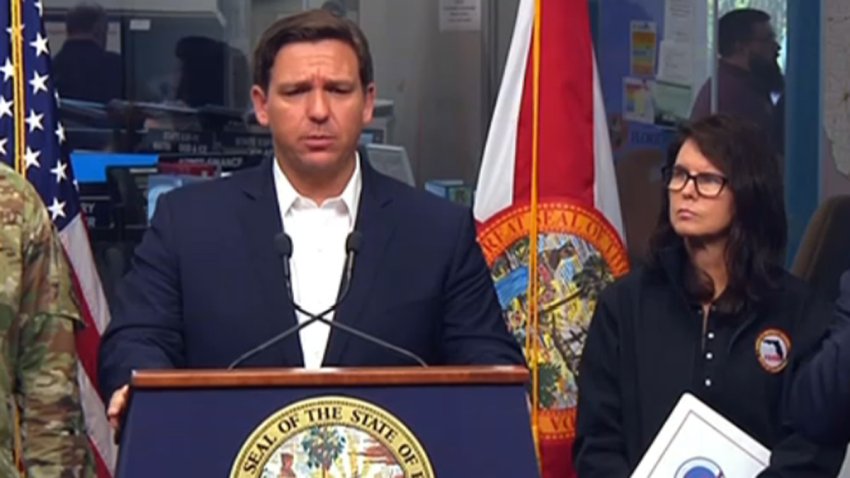NBC 6’s Derrick Lewis reports on the first day of testing at the South Dade Government Center.
What to Know
- Florida surpassed 12,000 confirmed COVID-19 cases Sunday
- More than 1,500 people were hospitalized throughout the state
- The state's death toll jumped to 221
Florida confirmed nearly 800 new coronavirus cases Sunday, bringing the state's total to 12,350. The number includes 11,961 Florida residents and 389 non-residents.
The state's death toll from the virus rose sharply to 221. Statewide, 1,555 people remain hospitalized.
CORONAVIRUS LATEST
Miami-Dade County continues to lead the state with 4,146 cases, about 33 percent of the state's total. Broward was second with 1,886 cases, followed by Palm Beach with 1,000. Monroe County had 44 cases.
The death toll in Miami-Dade stood at 31 Sunday, while Broward rose to 40 COVID-19-related deaths. Palm Beach led all Florida counties in reported deaths, with 49, and Monroe County remained at two deaths linked to the virus.
On Saturday, officials confirmed that two law enforcement officers had passed away after being diagnosed with COVID-19.
The first was Shannon Bennett, a 12-year veteran deputy with the Broward Sheriff's Office. Sheriff Gregory Tony said Bennett had tested positive for coronavirus on March 27th. He died on the evening of April 3rd.
The second was Jose Diaz Ayala, a sergeant who had spent 14 years with the Palm Beach County Sheriff's Office. The department didn’t release details about when or how Ayala contracted the disease.
Florida Gov. Ron DeSantis issued the statewide stay-at-home order Wednesday as federal and local pressure mounted on him to abandon the county-by-county approach he had implemented to combat the coronavirus pandemic, a position he had defended for weeks.
DeSantis told reporters he decided to issue the order after consulting with President Donald Trump and White House advisers, who have said Americans need to stay home through April. His order went into effect at 12:01 a.m. Friday and will last at least 30 days.
At a news conference Thursday, DeSantis encouraged people to get out and get exercise but not with large groups of people.
"It's less important what you do than how you do it," DeSantis said. "If you want to go for a 10-mile run by yourself and come back, more power to you. But you wouldn't be able to do a 20-person road race in the neighborhood with 19 of your friends."
The governor said it made sense to expand stay-home measures statewide now “even though there are a lot of places that have very low infection rates.” His move came the same day two other Republican governors in the South, Brian Kemp in Georgia and Tate Reeves of Mississippi, also issued stay-home orders after repeatedly refusing to do so.

“This is what we are going to be fighting for a month," DeSantis said. "There is not going to be any kind of return to normalcy. People thought Easter. … That is not going to happen.”
The order makes exceptions for buying food, medicine and gas, visiting doctors, outdoor exercise and commuting to jobs deemed essential. All businesses not considered essential must close, but can let employees work from home where feasible.
It also permits travel to religious services, although it was unclear whether such services would be subject to previous statewide orders prohibiting gatherings of more than 10 people. On Monday, police arrested a pastor in Tampa who violated the order by holding services for hundreds.
The Florida Chamber of Commerce said it backs the governor's decision as long as essential business is not impeded.
'While safety is the top priority, we also believe that it is important for essential workers to be able to get crops to the grocery store, ensure that our first responders' vehicles are maintained and ready to move and that we can get front line health care workers the safety equipment that they desperately need," spokeswoman Edie Ousley said.

DeSantis conceded that the order's success will mostly depend on the goodwill of residents as police won't in most cases know by sight if a person's reason for being out falls under an exemption. Violating a quarantine order in Florida can result in a 60-day jail sentence.
“I see some of these stories across the country … where someone steps out and someone tries to get them arrested. Look, at some point you do need to just exercise good judgment. The government can't ham-fist everyone into their bedroom,” he said.
DeSantis had been defending his county-by-county approach almost daily for the past two weeks as other governors in similarly heavily populated states including California, New York and Illinois, issued statewide lockdown orders.



